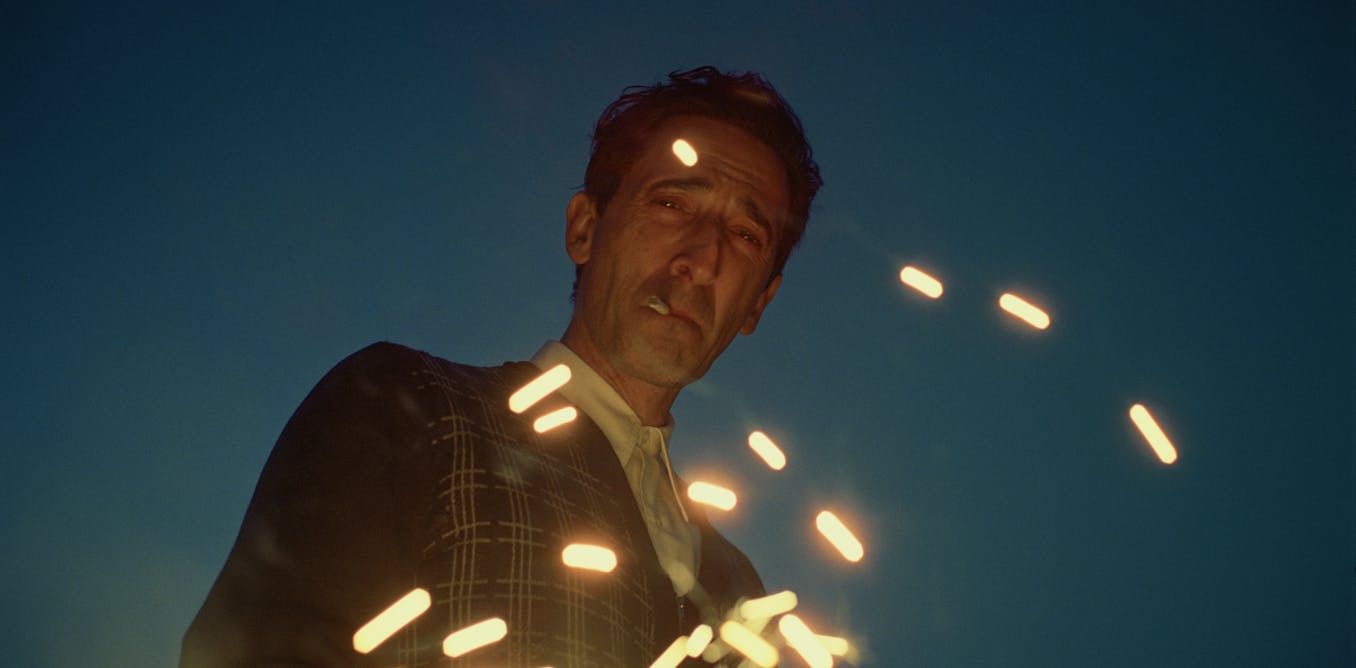The Brutalist has drawn attention this week for its use of artificial intelligence (AI) to refine some of the actors’ dialogue.
Emilia Pérez, a musical crime comedy, also used AI to extend lead star Karla Sofía Gascón’s vocal range. Her singing voice was blended with that of French popstar Camille, who co-wrote the film.
Earlier this month, Adrien Brody won the Golden Globe for best male actor for The Brutalist for his portrayal of the fictional Hungarian-Jewish Holocaust survivor László Tóth. He is a favourite to win the award at the Oscars, and Emilia Pérez is also a strong contender this awards season.
But should actors be eligible for awards if AI was used to refine a performance?
Can AI make ‘perfect’ possible?
The Brutalist’s editor, Dávid Jancsó, was the first to discuss the film’s use of AI. A native Hungarian speaker, Jancsó wanted the Hungarian language dialogue to sound flawless, “so that not even locals will spot any difference”.
Director Brady Corbet has been quick to clarify exactly how AI was used, emphasising the performances of Brody and his co-star Felicity Jones are their own.
In a statement, Corbet explained an AI tool from Ukrainian software company Respeecher was used only to edit the Hungarian language dialogue, “specifically to refine certain vowels and letters for accuracy”.
Corbet insists Brody’s and Jones’ performances in The Brutalist haven’t been replaced. Instead, they consented to a process of their voices being merged with dialogue recorded by Jancsó to ensure accurate Hungarian pronunciation. Their English dialogue remains untouched.
For Emilia Pérez, the film’s re-recording mixer Cyril Holtz said the process of extending Gascón’s range required collaboration from multiple artists.
AI in the film and television industry was a major concern of the 2023 SAG-AFTRA strike – and the fight for protections in the industry is far from over.
While the use of AI here may be limited to refining language portrayal, or extending a singer’s vocal range, it raises broader questions: what level of authenticity and accuracy are we comfortable with? If AI makes “perfect” possible, are we setting “perfect” as the new standard?
The role of the accent coach
Brody and Jones worked with accent coach Tanera Marshall to hone their Hungarian accents for The Brutalist. This accent is used in their English dialogue, which comprises the majority of the film.
As a voice and accent coach, my work involves training and supporting an actor’s voice to meet the demands of performance spaces, character and script. This includes building stamina for healthy, sustainable vocal use and equipping actors with skills to learn different accents.
By working with an accent coach, actors develop a dexterity key for mastering new accents and sustaining them throughout a performance.
Voice and accent work is central to a transformation into a character. Accents aren’t merely about modifying vowels and consonants. They involve rhythm, intonation, melody, and resonance. These elements inform and are informed by the life of the character.
For Brody and Jones, learning a Hungarian accent would have been integral to their process. The accent is inseparable from the portrayal of their characters.
It’s standard practice for actors to re-record some dialogue in automated dialogue replacement (ADR) during post-production. This can address background noise, minor script changes or accent slips. The accent coach typically accompanies the actor in the sound studio to ensure consistency.
However, according to Jancsó, even ADR wasn’t enough to perfect the Hungarian dialogue in The Brutalist. That’s when AI was introduced.
Accents are expressions of cultural identity, conveying as much about a character as their appearance. There is always a degree of variance as the actor makes the accent and performance their own. That’s part of creating a believable performance.
Unfortunately, filmmakers sometimes overlook the importance of accurate accent portrayal, opting instead for what they perceive as more universally accessible or commercially viable accents, or prioritising other elements of production like pacing or visual effects over linguistic precision.
The Brutalist’s commitment to linguistic precision is commendable. But are we comfortable with AI being the solution?
Read more:
Why bad posh English accents still rule Hollywood, from Nosferatu to Gladiator II
And the award goes to … AI?
The editing process revealed by The Brutalist and Emilia Pérez may be more common than we realise.
Rami Malek’s singing as Freddie Mercury in the biopic Bohemian Rhapsody (2018) was a mix of Queen master tapes, recordings by Canadian Christian rock singer Marc Martel (known for sounding like Mercury) and Malek’s voice.
Malek still won the best actor Oscar for his performance, even though the vocals were a blend. They were just one element of Bohemian Rhapsody, in the same way the Hungarian dialogue is just one aspect of The Brutalist.
In September 2024, Screen Australia released key principles to guide its approach to AI, prioritising human talent, transparency, ethical design, diversity, equity and inclusion, fairness and responsibility.
Much like these guidelines suggest, in The Brutalist and Emilia Pérez, the actors gave their consent, their talent was prioritised, and the filmmakers were transparent about the process. There’s even an argument that The Brutalist’s dedication to accurate Hungarian representation promotes inclusivity for an underrepresented language in Hollywood.
But it’s a slippery slope. When does refining turn into creating an entire voice through AI? And if accents and vocal ranges become easily modifiable, how long before actors themselves are at risk of redundancy?
The Brutalist is an exploration of complex themes around artistic integrity. Ironically, it may lean on technology that risks undermining the authenticity it strives to achieve. This paradox is worth reflecting on. In perfecting the portrayal of the human experience, are we losing some of its essence?

The post “When does an actor stop, and AI begin? What The Brutalist and Emilia Pérez tell us about AI in Hollywood” by Amy Hume, Lecturer In Theatre (Voice), Victorian College of the Arts, The University of Melbourne was published on 01/22/2025 by theconversation.com




































Leave a Reply